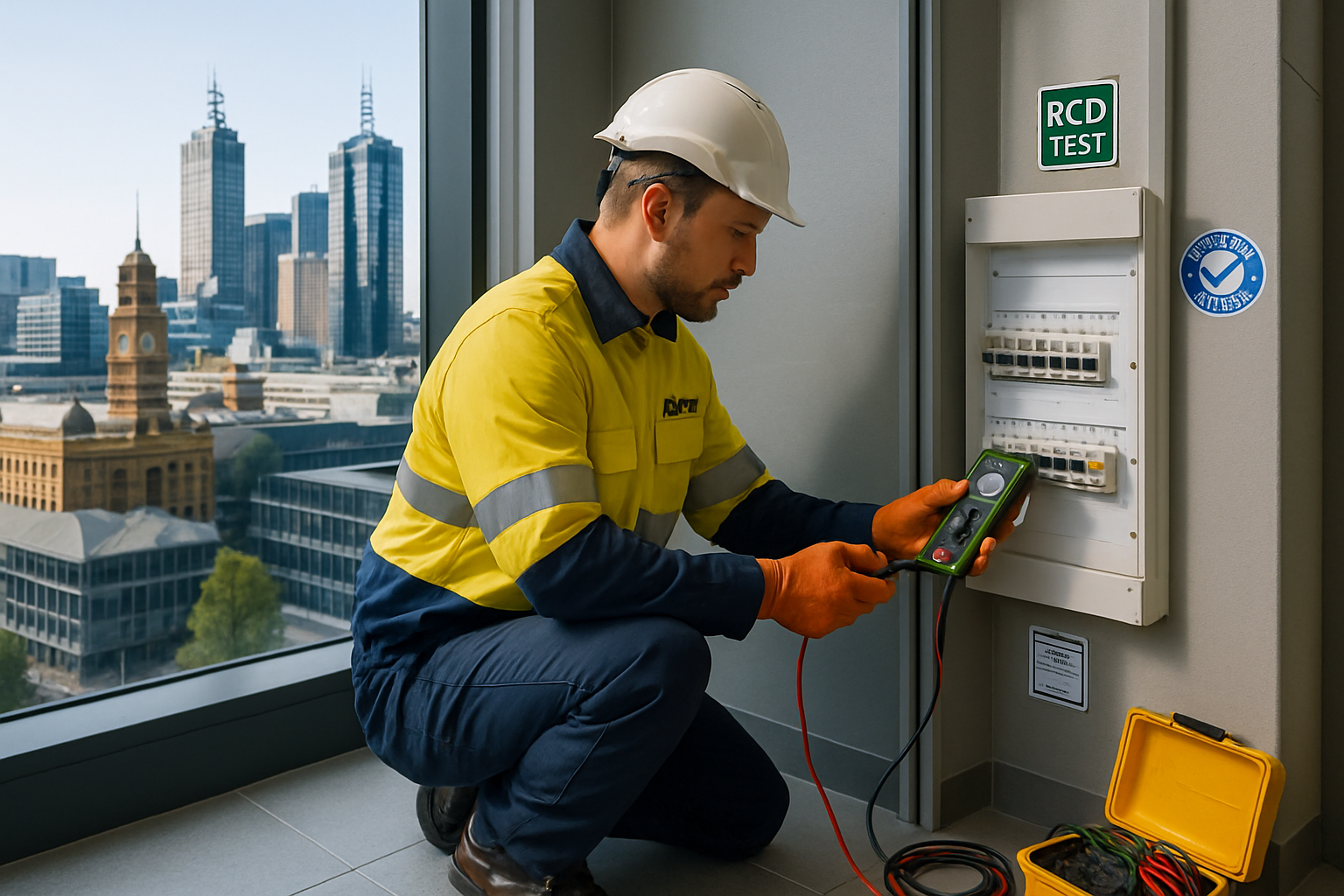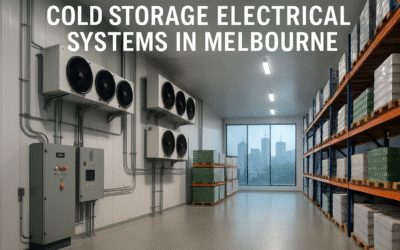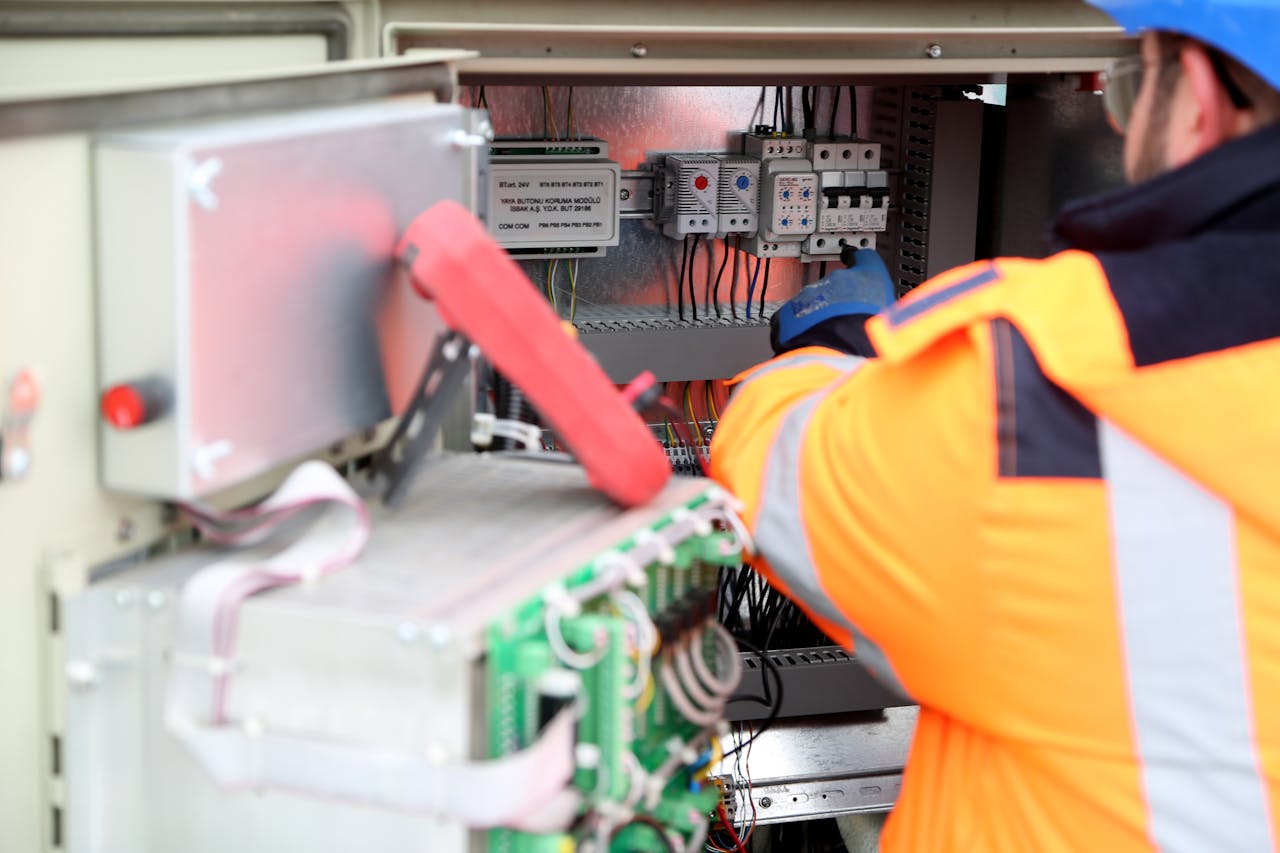- What Is RCD Testing?
- Why RCD Testing Is Critical for Commercial Properties in Melbourne
- Features and Benefits of Commercial RCD Testing
- Local Regulations and Best Practices for RCD Testing in Melbourne
- How to Find a Reliable Commercial Electrician in Melbourne for RCD Testing
- Preparing Your Commercial Property for RCD Testing
- Common Issues Found During RCD Testing & How to Address Them
- The Bigger Picture: Integrating RCD Testing into Your Total Electrical Safety Strategy
- Practical Tips for Business Owners: Making the Most of RCD Testing
- Conclusion
# RCD Testing Melbourne: Commercial Property Compliance
If you’re a small business owner in Melbourne managing a commercial property, electrical safety isn’t just a regulatory requirement—it’s a vital part of protecting your assets, staff, and customers. In today’s blog, we’re diving into the world of RCD testing for commercial premises, explaining why it’s so crucial for your business, and providing hands-on tips on how to stay compliant with local electrical safety codes. Whether you own an office space, retail store, industrial facility, or a hospitality venue, understanding and implementing effective RCD testing protocols can make a world of difference. Let’s get into the nuts and bolts of RCD testing and how it supports commercial electrical compliance in Melbourne.
What Is RCD Testing?
Understanding the Basics
An RCD (Residual Current Device) is an electrical safety mechanism designed to detect and disconnect a circuit immediately when it senses an imbalance—which could indicate earth leakage (unintentional flow of current to the ground) that might lead to electrical shock or a fire hazard. Unlike a standard circuit breaker that protects against overloads and short circuits, an RCD is solely focused on protecting people from electric shock by shutting off the power rapidly if it senses dangerous leakage currents.
How RCD Testing Works
RCD testing involves simulating a fault condition to check if the device trips correctly within the specified time limit. Typically, the test includes:
- RCD safety testing – Verifying that the RCD trips within 0.3 seconds (or less, depending on the specifications) when a leakage current is detected.
- Earth leakage testing – Checking that the device correctly measures small leakage currents before any dangerous situation escalates.
- Electrical fault detection – Ensuring the wiring and installed electrical components meet safety standards and no hidden faults exist.
This process is essential in any commercial building because even a small fault can lead to significant safety hazards, downtime, or even legal issues if you’re not compliant with local regulations.
Why RCD Testing Is Critical for Commercial Properties in Melbourne
Protecting Your People and Property
Commercial properties in Melbourne must adhere to stringent safety standards. Regular RCD testing is a proactive way to ensure that all installed safety switches are functioning properly, protecting your staff, customers, and valuable equipment from the hazards associated with electrical faults. Here are some key reasons why RCD testing shouldn’t be ignored:
- Workplace Electrical Safety Compliance: Implementing regular RCD testing helps ensure that your business stays compliant with Australian safety standards and local Melbourne electrical safety regulations.
- Prevention of Electrical Accidents: Faulty RCDs can result in a higher risk of electric shock and electrical fires. Early detection and remediation of issues can prevent costly accidents.
- Insurance and Liability: In case of an incident, having documented proof of regular RCD safety testing and maintenance can help with insurance claims and may protect you from liability concerns.
Staying on the Right Side of the Code
Adhering to local regulations is as crucial as ensuring the safety of your premises. In Melbourne, commercial electrical compliance is monitored through checks such as safety switch testing and circuit breaker inspections. These inspections are mandated by relevant standards (e.g., AS/NZS 3760 and other applicable codes) which require commercial property owners to conduct regular tests and maintain proper documentation. Failing to comply can lead to fines, business interruptions, and even legal action in the event of an accident.
Features and Benefits of Commercial RCD Testing
Key Features of RCD Testing for Commercial Premises
- Safety Switch Testing: RCD testing ensures that safety switches trip promptly during an electrical fault, protecting individuals from potential electrical shock.
- Earth Leakage Evaluation: Regular checks help identify traces of leakage that might indicate deteriorating wiring or insulation failures, enabling pre-emptive corrective measures.
- Fault Isolation and Detection: Testing assists in diagnosing hidden faults within your electrical system, offering peace of mind that any potential risk is spotted early.
- Documented Compliance: Professional testing services provide detailed reports and certification, valuable for audits and demonstrating compliance with workplace electrical safety regulations.
- Preventative Maintenance: Scheduled RCD maintenance and testing form part of an ongoing electrical risk assessment, reducing the chances of unexpected outages and costly repairs.
Benefits to Your Business
- Enhanced Safety: With effective RCD testing, you reduce the risk of accidents involving live electrical components, protecting both personnel and property.
- Regulatory Peace of Mind: Being ahead in compliance means fewer regulatory hiccups and easier inspections. Updated documentation and certificates provide evidence that your business follows “Melbourne electrical safety audits” standards.
- Cost Savings in the Long Run: Proactively identifying and replacing malfunctioning equipment prevents more severe faults that might otherwise result in expensive repairs or operational downtime.
- Improved Reputation: Clients, customers, and tenants are more likely to trust a commercial property that prioritizes robust safety measures and complies with all relevant codes.
- Insurance Benefits: Many insurance companies favor properties that demonstrate a comprehensive approach to safety, which can sometimes lead to lower premiums or more favorable terms on future contracts.
Local Regulations and Best Practices for RCD Testing in Melbourne
Understanding the Regulatory Environment
Melbourne, like other parts of Australia, is governed by strict electrical safety standards intended to protect the public and ensure business continuity. Some essential points include:
- Australian Standards (AS/NZS 3760): This standard outlines the procedures and intervals for inspecting and testing electrical equipment. Although primarily for portable appliances, many commercial electrical systems refer to similar standards that apply to permanent wiring and safety switches.
- Electricity Safety Act and Regulations: Businesses in Melbourne must adhere to these local regulations which cover all aspects of electrical work, including installation, testing, and certification. Compliance ensures that your property meets the necessary safety thresholds to protect against accidents.
- Local Government Regulations: Specific councils in Melbourne might have additional electrical safety requirements, especially for high-occupancy or high-risk properties like commercial kitchens or industrial facilities.
- Workplace Health and Safety (WHS) Guidelines: These guidelines emphasize the importance of regular electrical safety checks as part of a broader commitment to maintaining a safe workplace environment.
Best Practices for RCD Testing in Commercial Properties
- Regular Scheduled Testing: Establish a maintenance schedule based on the manufacturer’s recommendations and local regulatory advice. Many experts suggest RCD testing at least annually, with more frequent tests in older or heavily used buildings.
- Keep Detailed Records: Maintain comprehensive documentation of all tests and inspections. Not only does this help with compliance during audits, but it also serves as a history of your property’s electrical maintenance.
- Qualified Electricians Only: Always hire licensed and experienced commercial electricians in Melbourne to conduct RCD testing and any necessary repairs. Their expertise ensures that testing meets the highest standards of precision and safety.
- Periodic Reassessment of Electrical Systems: As your business grows, your electrical demands might change. Schedule periodic assessments to ensure that your infrastructure scales with your operational needs.
- Integration with Overall Preventative Maintenance: Include RCD testing as part of an all-encompassing preventative maintenance plan that checks for other risks like circuit breaker wear and leakage in wiring systems.
How to Find a Reliable Commercial Electrician in Melbourne for RCD Testing
Ask the Right Questions
When it comes to RCD testing for your commercial property, choosing the right service provider is as important as the testing itself. Here are some practical steps to help you find a capable and reliable commercial electrician:
- Check Licensing and Accreditation: Ensure that the electrician or electrical contracting company is fully licensed and adheres to the Australian Standards. Ask for proof of qualifications and any relevant certifications related to commercial electrical compliance in Melbourne.
- Experience Matters: Look for electricians who specialize in commercial properties and have experience with RCD safety testing. With complex infrastructures in offices, retail spaces, and industrial sites, you need someone who understands your unique challenges.
- Ask for References and Testimonials: Don’t hesitate to request case studies, reviews, or references from previous commercial clients. Feedback from fellow business owners can provide valuable insights into the electrician’s quality of work and reliability.
- Insurance and Warranty: Verify that the electrician has current insurance coverage which protects both them and your business in the event of an incident. Additionally, inquire about any warranty provided on the services rendered.
- Competitive Pricing: While cost shouldn’t be the sole determining factor, ensure that you get a detailed quote that outlines all aspects of the testing and any potential follow-up work. A transparent pricing model often indicates a trustworthy service provider.
Utilize Local Resources
- Local Directories and Trade Associations: Search through reputable directories such as the Master Electricians Australia website or local Melbourne business listings. These resources often feature qualified professionals who specialize in commercial electrical safety audits.
- Word-of-Mouth: Networking with other Melbourne business owners can lead to personal recommendations. Often, the best electricians are known through local circles and industry-specific communities.
- Online Reviews and Social Media: Platforms like Google Reviews, LinkedIn, and local community forums can provide feedback, ratings, and testimonials about electricians’ performance and reliability.
- Professional Consultation: Consider scheduling consultations with multiple electricians to discuss your RCD testing requirements. This face-to-face or virtual meeting can help you gauge their expertise and professionalism.
Preparing Your Commercial Property for RCD Testing
Steps to Ensure a Smooth Testing Process
Once you’ve nailed down a trusted commercial electrician in Melbourne, it’s time to prepare your premises for RCD testing. Here’s a step-by-step guide:
- Review Previous Testing Records: Gather all documentation from past RCD inspections, electrical risk assessments, and maintenance logs. This will help the electrician understand your electrical history and any recurring issues.
- Identify High-Risk Areas: Work with your electrician to pinpoint zones with heavy electrical usage or prior incidents of faults. These could include areas with extensive machinery, computer servers, or commercial kitchens.
- Clear and Secure the Testing Environment: Ensure that the testing areas are easily accessible. Remove any obstacles and secure sensitive equipment that might be affected by power interruptions during the test.
- Plan for Service Disruptions: Arrange for a backup plan or temporary alternatives if parts of your building need to be powered down during testing. Communicate any downtime to staff and, if applicable, clients well in advance.
- Test All Relevant RCDs: Confirm that every RCD, including those installed in hidden or less-frequented areas (like storage rooms or mechanical spaces), is included in the testing schedule. Complete coverage ensures that no part of your system falls through the cracks.
- Post-Testing Review: Once testing is complete, review the detailed report provided by your commercial electrician. Understand any failures or irregularities identified and plan corrective measures in consultation with your service provider.
Post-Testing Steps
After your RCD testing is complete, consider the following actions to keep your commercial property compliant:
- Address Identified Issues Promptly: If the report highlights any failures or borderline conditions, schedule immediate repairs or replacements. Preventative measures now can save you from more significant problems later.
- Update Your Maintenance Schedule: Use the testing results to refine your maintenance schedule. Regular, documented checks can be integrated into your overall electrical risk management plan.
- Keep an Open Line of Communication: Maintain a regular relationship with your electrician. Periodic check-ins and consultations allow changes in electrical demands to be addressed proactively.
Common Issues Found During RCD Testing & How to Address Them
Frequent Faults in Commercial Settings
Even with a well-maintained electrical system, certain faults may crop up during routine RCD testing. Understanding common issues can help you prepare for and mitigate these risks:
- Delayed RCD Tripping: Occasionally, an RCD might take longer than the prescribed time to trip. This could be due to aging components, internal wiring issues, or calibration drift.
• Tip: Have your electrician recalibrate the device or replace it if it consistently fails to meet the required response time. - Intermittent Faults: Some RCDs might exhibit intermittent faults that are difficult to replicate. These issues could stem from environmental factors such as moisture or accidental physical damage.
• Tip: Schedule a follow-up inspection and monitor the affected areas closely. Document any irregular behavior to provide a clear record for your service provider. - Wiring Deterioration or Damage: In commercial buildings, older wiring may not perform up to current safety standards. Excessive wear can lead to leakage currents that may intermittently trigger RCDs.
• Tip: A comprehensive electrical audit may be necessary to update outdated wiring or insulation in line with current Australian Standards. - Overload Conditions in High-Demand Areas: Areas with heavy machinery or high-powered equipment can sometimes overwhelm an RCD, leading to nuisance tripping.
• Tip: Consider redistributing loads across different circuits or upgrading your electrical infrastructure to support increased demand. - Poor Maintenance Records: Lack of detailed historical data can complicate fault diagnosis. If previous testing records are missing or incomplete, pinpointing recurring issues may become challenging.
• Tip: Start a centralized documentation system for all electrical tests, repairs, and upgrades moving forward.
Proactive Steps to Mitigate Common Issues
- Routine Inspections: Don’t wait for a problem to arise. Regular inspections, along with periodic RCD and circuit breaker testing, can help catch deteriorating systems before they become dangerous.
- Upgrading Legacy Systems: If your property relies on older electrical installations, consider consulting with your electrician about upgrading to modern standards that improve efficiency and safety.
- Employee Awareness: Educate your staff about the importance of electrical safety and the role of RCDs. Informed employees can often spot potential hazards early, helping to initiate maintenance calls sooner rather than later.
The Bigger Picture: Integrating RCD Testing into Your Total Electrical Safety Strategy
A Holistic Approach to Safety
- Preventative Electrical Maintenance: RCD testing isn’t a one-off task—it’s an integral component of a broader preventative maintenance program. Regular check-ups, combined with other services like circuit breaker evaluations and earth leakage tests, help ensure a consistently safe working environment.
- Risk Management and Assessment: Integrating RCD testing with periodic risk assessments allows you to identify other potential electrical hazards in your business premises. This approach fosters a proactive culture of safety, reducing the likelihood of unexpected failures and service interruptions.
- Compliance Documentation: Maintaining up-to-date evidence of RCD testing is invaluable during safety audits. Detailed records not only help you meet legal requirements but also provide clear documentation should any insurance claims or liability issues arise.
Long-Term Benefits for Business Owners
- Reduced Downtime: When electrical faults are caught and managed early, you significantly reduce the risk of sudden power outages or even fire hazards. This stability is crucial for any commercial operation, minimizing disruptions to your daily activities.
- Improved Business Reputation: Demonstrating a commitment to safety can be a strong selling point for potential tenants, clients, and partners. It shows that you value high standards and proactive management—qualities that enhance your credibility and business reputation.
- Financial Savings: Proactive electrical safety not only minimizes the risk of accidents and insurance claims but also can lead to lower insurance premiums. Over time, the cost savings from avoided downtime and preventive repairs can be substantial.
Practical Tips for Business Owners: Making the Most of RCD Testing
As a business owner, ensuring your commercial property remains safe while complying with Melbourne’s regulations can seem overwhelming. Here are some simple, actionable tips to help you navigate this process:
- Schedule Regular Testing Early: Don’t wait for the next routine inspection to raise the alarm. Proactively schedule your RCD testing as part of your regular maintenance routine—ideally annually, if not more often for high-risk areas.
- Ask for a Detailed Report: After testing, ask your electrician for a comprehensive report that outlines any issues found, corrective recommendations, and dates for follow-up tests. This report is your record of compliance and should be kept with other property maintenance files.
- Invest in Quality Equipment: When upgrades are necessary, opt for high-quality, reputable brands that meet Australian safety standards. Quality equipment will not only improve immediate safety but also have better longevity, saving you money in the long run.
- Stay Up-to-Date with Regulations: Electrical safety codes and standards evolve. Regularly check for updates from local councils or industry websites that provide the latest news on Melbourne electrical safety regulations. This vigilance ensures that your property remains compliant.
- Train Your Staff: Basic electrical safety training for your staff can contribute to a safer workplace. Everything from how to handle minor incidents to recognizing the early signs of electrical problems can empower your team to act swiftly and wisely.
- Plan for Emergencies: Always have an action plan in case of an electrical failure. Ensure that fire alarms, emergency lighting, and evacuation procedures are up-to-date and that your team is briefed on protocols.
- Budget for Regular Maintenance: Allocate funds specifically for electrical maintenance, including RCD testing. Investing in safety now can prevent costly repairs or replacements later and minimize the risk of business interruptions.
- Engage with a Trusted Electrical Contractor: Building a long-term relationship with a reputable commercial electrician in Melbourne means you’ll have an expert on call who understands your building’s history and unique needs.
Conclusion
To sum it all up, RCD testing for commercial properties in Melbourne is not just a regulatory obligation—it’s a crucial safeguard for your business’s infrastructure, your employees’ safety, and your long-term operational reliability. By implementing a thorough RCD testing regime and integrating it with your overall electrical safety strategy, you position your business ahead of potential hazards and compliance challenges.
In today’s fast-paced business world, staying proactive about safety measures means fewer disruptions, enhanced credibility, and ultimately, a healthier bottom line. Whether you’re running an office building, retail space, warehouse, or hospitality venue, properly maintained RCDs are a cornerstone of commercial electrical compliance. They offer peace of mind, ensure you meet local safety standards, and protect your people from potentially life-threatening electrical faults.
So, take action today—review your existing maintenance schedules, reach out to qualified Melbourne commercial electricians, and secure your business with regular, professional RCD safety testing. Not only are you investing in your property, but you’re also investing in the trust and security that your employees, clients, and tenants depend upon.
Feel free to leave any comments or questions below; we’re here to help you navigate the often complex world of electrical safety. Remember, a safe business is a successful business. Stay compliant, stay safe, and let your commercial property shine as a beacon of quality and reliability in Melbourne’s vibrant business landscape.
By following the practical tips outlined above and prioritizing regular RCD testing, you’re ensuring that your commercial building meets all local standards—from workplace electrical safety compliance to thorough Melbourne electrical inspections. With the right commercial electrician by your side, you can be confident that your electrical systems are up to code, giving you one less thing to worry about as you focus on growing your business.
Thank you for reading this comprehensive guide on RCD Testing Melbourne: Commercial Property Compliance. If you’re ready to take the next step toward ensuring your business remains safe and compliant, contact a local Melbourne electrical contractor today and experience the benefits of a well-maintained, safe electrical system.





0 Comments